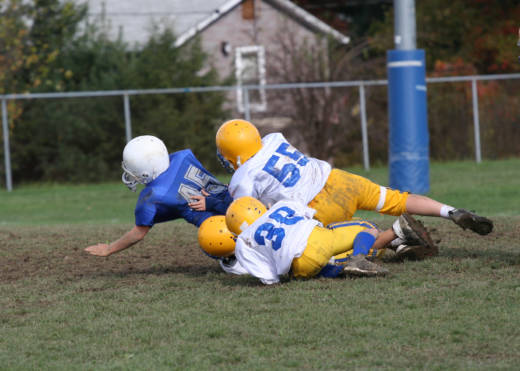Those views were bolstered by a study published April 30 that found playing youth tackle football may lead to earlier onset of cognitive, behavioral and emotional symptoms in later life.
Researchers at the Boston University School of Medicine conducted telephone interviews with the friends and relatives of 246 deceased football players and found that those who played tackle football before 12 experienced symptoms on average 13 years earlier than those who started playing at an older age.
Researchers took into account different styles of play and forms of protection.
"It took looking at 246 brains and seeing this in nearly 90 percent of them to say, 'Hey, you know what, the research is becoming very clear, that you hit someone in the head too much, you'll give them this disease,' " Christopher Nowinski, co-founder of Boston University's CTE Center, said on KQED's Forum program last week.
Joe Rafter, the president of Southern Marin Youth Football who started a group to oppose the ban, disputes those findings and says the sport is "safer than its ever been."
He pointed to revised coaching methods and behavior modification techniques that he argues have made the sport safer.
"The game that was played 40 to 50 years ago is no longer played now," he said. "The techniques that are taught right now in youth football across America are to take the head out of the tackle."
Public Health Issue
But Nowinski, a former football player, says changes made in the sport are not enough to make it safe for youth. The problem is not the occasional major hit to the head, he said, but the repetitive tackling, hitting and blocking.
"This is the best data that we are going to have for decades, because we have taken the effort to actually build the world's largest brain bank of former football players, and we just really struggle to find football players who don't have CTE who've had long careers," he said. "Even if we diagnose concussions, a concussion happens maybe once out of every couple thousand of times a child is hit in the head. CTE risk is related to those thousands of hits, not to that concussion."
Nowinski says the issue is a matter of public health.
"This is about protecting kids from degenerative brain disease. It's not unlike saying, 'Let's take the lead out of the paint in their home because it might rot their brain.' Let's not hit them in the head 500 times because it might rot their brain."
But Rafter says eliminating football will affect many children from undeserved communities.
"[T]hey come together and experience different communities, different lifestyles through this sport," he said.
Rafter said he's received phone calls from coaches in poor neighborhoods thanking him for his efforts.
"I can tell you I'm getting phone calls and emails from coaches in undeserved communities of Los Angeles thanking us," he said. "Because if these boys don't have youth sports, they will get mixed into the wrong path."
Nowinski, however, says football is not the solution to poverty.
"I have a problem with the idea that we're going to take kids that we already know are vulnerable, and we are going to hit them in the head a few hundred times a year, and open them up to this door of concussions and long-term [brain] disease," he said. "It's sort of doubling down on a problem."
